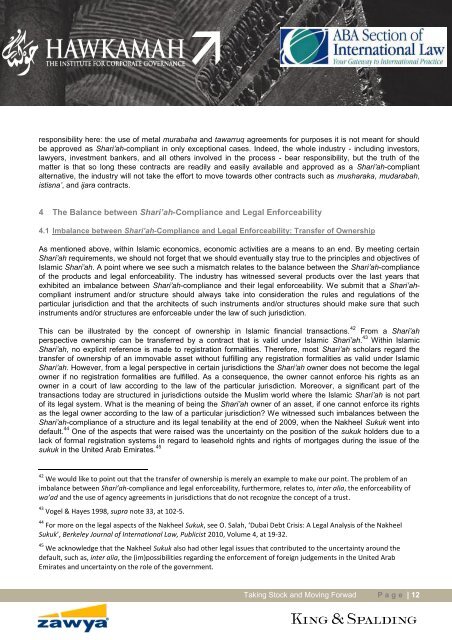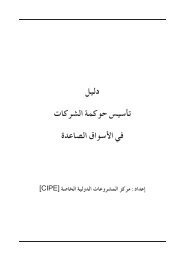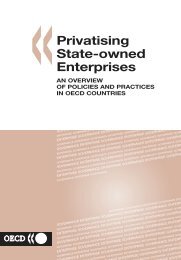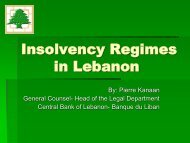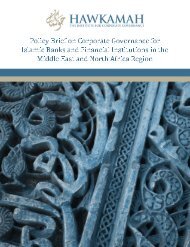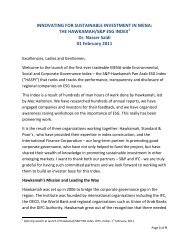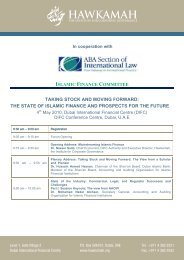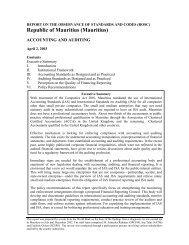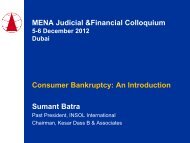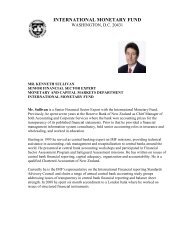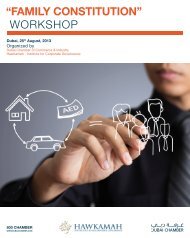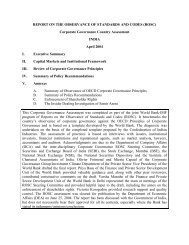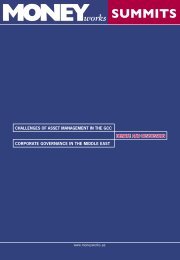THE STATE OF ISLAMIC FINANCE AND PROSPECTS FOR THE ...
THE STATE OF ISLAMIC FINANCE AND PROSPECTS FOR THE ...
THE STATE OF ISLAMIC FINANCE AND PROSPECTS FOR THE ...
- No tags were found...
You also want an ePaper? Increase the reach of your titles
YUMPU automatically turns print PDFs into web optimized ePapers that Google loves.
esponsibility here: the use of metal murabaha and tawarruq agreements for purposes it is not meant for shouldbe approved as Shari’ah-compliant in only exceptional cases. Indeed, the whole industry - including investors,lawyers, investment bankers, and all others involved in the process - bear responsibility, but the truth of thematter is that so long these contracts are readily and easily available and approved as a Shari’ah-compliantalternative, the industry will not take the effort to move towards other contracts such as musharaka, mudarabah,istisna’, and ijara contracts.4 The Balance between Shari’ah-Compliance and Legal Enforceability4.1 Imbalance between Shari’ah-Compliance and Legal Enforceability: Transfer of OwnershipAs mentioned above, within Islamic economics, economic activities are a means to an end. By meeting certainShari’ah requirements, we should not forget that we should eventually stay true to the principles and objectives ofIslamic Shari’ah. A point where we see such a mismatch relates to the balance between the Shari’ah-complianceof the products and legal enforceability. The industry has witnessed several products over the last years thatexhibited an imbalance between Shari’ah-compliance and their legal enforceability. We submit that a Shari’ahcompliantinstrument and/or structure should always take into consideration the rules and regulations of theparticular jurisdiction and that the architects of such instruments and/or structures should make sure that suchinstruments and/or structures are enforceable under the law of such jurisdiction.This can be illustrated by the concept of ownership in Islamic financial transactions. 42 From a Shari’ahperspective ownership can be transferred by a contract that is valid under Islamic Shari’ah. 43 Within IslamicShari’ah, no explicit reference is made to registration formalities. Therefore, most Shari’ah scholars regard thetransfer of ownership of an immovable asset without fulfilling any registration formalities as valid under IslamicShari’ah. However, from a legal perspective in certain jurisdictions the Shari’ah owner does not become the legalowner if no registration formalities are fulfilled. As a consequence, the owner cannot enforce his rights as anowner in a court of law according to the law of the particular jurisdiction. Moreover, a significant part of thetransactions today are structured in jurisdictions outside the Muslim world where the Islamic Shari’ah is not partof its legal system. What is the meaning of being the Shari’ah owner of an asset, if one cannot enforce its rightsas the legal owner according to the law of a particular jurisdiction? We witnessed such imbalances between theShari’ah-compliance of a structure and its legal tenability at the end of 2009, when the Nakheel Sukuk went intodefault. 44 One of the aspects that were raised was the uncertainty on the position of the sukuk holders due to alack of formal registration systems in regard to leasehold rights and rights of mortgages during the issue of thesukuk in the United Arab Emirates. 4542 We would like to point out that the transfer of ownership is merely an example to make our point. The problem of animbalance between Shari’ah-compliance and legal enforceability, furthermore, relates to, inter alia, the enforceability ofwa’ad and the use of agency agreements in jurisdictions that do not recognize the concept of a trust.43 Vogel & Hayes 1998, supra note 33, at 102-5.44 For more on the legal aspects of the Nakheel Sukuk, see O. Salah, ‘Dubai Debt Crisis: A Legal Analysis of the NakheelSukuk’, Berkeley Journal of International Law, Publicist 2010, Volume 4, at 19-32.45 We acknowledge that the Nakheel Sukuk also had other legal issues that contributed to the uncertainty around thedefault, such as, inter alia, the (im)possibilities regarding the enforcement of foreign judgements in the United ArabEmirates and uncertainty on the role of the government.Taking Stock and Moving Forwad P a g e | 12


